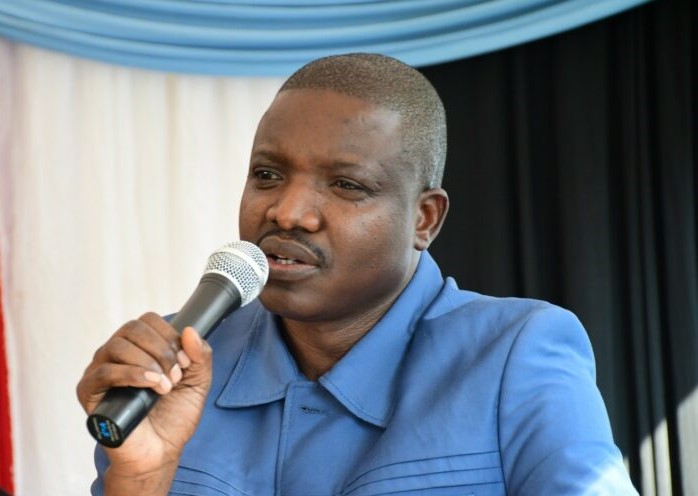
Dr. James Alic Garang, the Governor of the Central Bank of South Sudan Juba. December 17, 2023. (Photo: Madrama James/Eye Radio)
The Bank of South Sudan governor lamented lack of economic diversification and insufficient revenue collection as the main causes of the current economic crisis facing the country.
Dr. James Alic Garang made the remarks on Saturday during the opening of Central Bank branch in Nimule at the border with Uganda.
He said the country runs the risk of reliance on oil as the only major source of revenue while stressing the need to boost agricultural productivity.
South Sudan exclusively exports crude oil through Sudan to the international market through the Red Sea corridor.
The oil income accounts for over 90 percent of the country’s revenue.
However, one of its major pipelines transporting the crude through war ravaged Sudan is now closed after crippling technical problems that have not been repaired.
Bank Governor Alic said improving local production while raising sufficient tax proceeds to meet government obligations remains key towards economic recovery.
“To minimize the risk associated with the observed cyclicity of oil proceeds, South Sudan must diversify its resources of natural income and taxes,” Dr. Garang said.
“I posit that economic diversification presupposes a focus in agriculture where we enjoy Ricardian advantage. This preposition is rightly so since a large segment of our society depends on agriculture as the mainstay of their subsistence.”
He said South Sudan has a comparative advantage in many areas given the vast arable land and existence of rare natural resources.
Alic added that boosting agricultural production is key as it allows economic actors to produce more for dual purposes.
The UN’s Food and Agriculture Organization said up to 95 percent of South Sudanese rely on farming, herding, or fishing.
But according to the United States international development agency USAID, conflict and climate shocks in South Sudan have significantly damaged agricultural production.
– Weakening currency –
South Sudan’s currency drastically weakened against the United States dollar between February and March, triggering a sharp increase in commodity prices across the country.
The situation is blamed on dwindling revenue due to the impact of the war in Sudan and the Red Sea blockade on the country’s precious oil export.
This has induced economic hardships that leave the government struggling to pay civil servants salaries, as the public workforce goes for seven months without its dues.
The Central Bank exchange rate posted on Monday, March 25, 2024, shows one dollar trading at an average of 1,581 South Sudanese pounds, while in the black market, one dollar cost around 2,000 pounds.
The Sudanese government on March 16, declared force majeure, saying it is unable to facilitate the transportation of South Sudan crude oil through the Jabalayn-Port Sudan Pipeline, citing interruptions from the ongoing conflict.
Khartoum invoked the force majeure to suspend its obligations to deliver crude oil through the BAPCO Transportation System to the Bashayer 2 Marine Terminal.
This essentially means that Sudan is invoking a contractual clause that exempts it from fulfilling its obligations under the agreement due to unforeseen circumstances or events beyond its control.
By declaring force majeure, Sudan seeks legal protection from any potential liability for failing to meet its contractual commitments under the oil agreement.
– Food subsidies –
The National Ministry of Trade and Industry responded to the food crisis by opening six subsidized food stores selling maize in Juba to enable the public to afford food at cheaper price.
Trade ministry undersecretary, Kuol Daniel Ayulo, said the same initiative would also be extended to the states in a few weeks’ time, to enable every household to afford the cost of living.
But an economist slammed the “short term” economic relief initiative, suggesting that the only way to ultimately beat inflation is providing a stable environment and boosting agriculture.
Dr. Abraham Maliet said the purchase of food items is unsustainable and a drop in the ocean and recommended the procurement of farming tools and equipment to support agricultural production.
Support Eye Radio, the first independent radio broadcaster of news, information & entertainment in South Sudan.
Make a monthly or a one off contribution.
Copyright 2024. All rights reserved. Eye Radio is a product of Eye Media Limited.